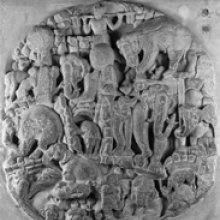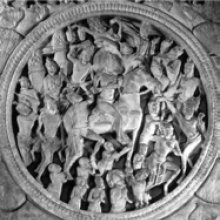Rana, Raṇa, Raṅa, Rāṅa, Rānā: 26 definitions
Introduction:
Rana means something in Buddhism, Pali, Hinduism, Sanskrit, the history of ancient India, Marathi, Jainism, Prakrit, Hindi, biology. If you want to know the exact meaning, history, etymology or English translation of this term then check out the descriptions on this page. Add your comment or reference to a book if you want to contribute to this summary article.
Images (photo gallery)
(+8 more images available)
In Hinduism
Purana and Itihasa (epic history)
Source: archive.org: Puranic EncyclopediaRaṇa (रण).—A Rākṣasa. He was killed by Vāyu deva in the war between Hiraṇyākṣa and the Devas. (Padma Purāṇa, Sṛṣṭi Khaṇḍa).
Source: archive.org: Shiva Purana - English TranslationRaṇa (रण) refers to “war”, according to the Śivapurāṇa 2.2.36. Accordingly, as Brahmā narrated to Nārada:—“on hearing these words of Dakṣa. the gods including Indra set off immediately in their readiness to fight. [...] Conchs were blown. Drums were beaten in that great war festival [viz., raṇa-mahotsava]. Battle drums were sounded both big and small”.

The Purana (पुराण, purāṇas) refers to Sanskrit literature preserving ancient India’s vast cultural history, including historical legends, religious ceremonies, various arts and sciences. The eighteen mahapuranas total over 400,000 shlokas (metrical couplets) and date to at least several centuries BCE.
Shaktism (Shakta philosophy)
Source: Google Books: ManthanabhairavatantramRaṇa (रण) refers to a “battle”, according to the Ṣaṭsāhasrasaṃhitā, an expansion of the Kubjikāmatatantra: the earliest popular and most authoritative Tantra of the Kubjikā cult.—Accordingly, “One should institute a great sacrifice at times of great fear, [...]. This (great sacrifice) brings every success and is the sure means of getting (whatever) one thinks about. I will tell (you) that clearly as it (truly) is. One should make a level canopy measuring sixteen (handspans) in a frightening forest, or (beside) a solitary tree or a single beautiful Liṅga, in a temple dedicated to the Mothers, on a battle ground [i.e., raṇa-sthāna], on a threshing floor, in a house, or (places) that are tranquil, terrifying, or romantic as one pleases. Beautiful with flags and garlands, (it is erected) to (win) victory in battle with the enemy and for other purposes as they arise, each separately”.

Shakta (शाक्त, śākta) or Shaktism (śāktism) represents a tradition of Hinduism where the Goddess (Devi) is revered and worshipped. Shakta literature includes a range of scriptures, including various Agamas and Tantras, although its roots may be traced back to the Vedas.
Shaivism (Shaiva philosophy)
Source: SOAS University of London: Protective Rites in the Netra TantraRaṇa (रण) refers to a “battle”, according to the Svacchanda-tantra.—Accordingly, [verse 4.13-16, while describing auspicious dreams]—“After [the dreamer] has seen these [images listed above], he is successful. Likewise, [success comes to those who] obtain the Earth and a [battle] wound. Victory in battle (raṇa—vijayaṃ raṇe) and crossing the battle field, which is an ocean of blood and blazes like a place of the departed [are auspicious]. [Someone who] commands heroes and persons who rule [with] victory [are fortunate signs]. [...]”.

Shaiva (शैव, śaiva) or Shaivism (śaivism) represents a tradition of Hinduism worshiping Shiva as the supreme being. Closely related to Shaktism, Shaiva literature includes a range of scriptures, including Tantras, while the root of this tradition may be traced back to the ancient Vedas.
In Buddhism
Mahayana (major branch of Buddhism)
Source: Wisdom Library: Maha Prajnaparamita SastraRaṇa (रण) refers to a “battle”, according to Mahāprajñāpāramitāśāstra (chapter 39).—Accordingly, “[The knowledge of the retribution of actions (karmavipāka-jñānabala)].—[...] [How can the mind at death, which lasts only a short time, prevail over the power of actions that extend over an entire lifetime?]—Although this mind may be very short, its power is intense. It is like fire or poison that, although small, can accomplish great things. The mind at death is so determinate and so strong that it prevails over the power of action extending over a century. This last mind is called ‘the great mind’ (mahācitta) for it has, as its urgent task, the abandoning of the body and the organs Thus the man in battle (raṇa), who does not spare his life, is called a hero (śūra), and the Arhat, who gives up attachment to life, attains Arhat-hood [...]”.
Source: academia.edu: A Study and Translation of the GaganagañjaparipṛcchāRaṇa (रण) refers to “depravity” (as opposed to Araṇa—‘freedrom from depravity’), according to the Gaganagañjaparipṛcchā: the eighth chapter of the Mahāsaṃnipāta (a collection of Mahāyāna Buddhist Sūtras).—Accordingly, as Bodhisattva Gaganagañja explains to Bodhisattva Ratnaśrī what kind of concentration should be purified: “[...] (37) [when the Bodhisattvas attain] the concentration called ‘Entering into appearance’, all objective supports will be purified; (38) [when the Bodhisattvas attain] the concentration called ‘Being free from depravity’ (araṇa-samādhi), they will transcend all objective supports; (39) [when the Bodhisattvas attain] the concentration called ‘Stainless wheel’, the wheel of the dharma will be purified; [...]”.

Mahayana (महायान, mahāyāna) is a major branch of Buddhism focusing on the path of a Bodhisattva (spiritual aspirants/ enlightened beings). Extant literature is vast and primarely composed in the Sanskrit language. There are many sūtras of which some of the earliest are the various Prajñāpāramitā sūtras.
India history and geography
Source: Cologne Digital Sanskrit Dictionaries: Indian Epigraphical GlossaryRāṇa.—(EI 16, 23), same as Rāṇaka; see Rāṇa-putra, rāṇa-kula. Note: rāṇa is defined in the “Indian epigraphical glossary” as it can be found on ancient inscriptions commonly written in Sanskrit, Prakrit or Dravidian languages.
--- OR ---
Rāṇā.—(IE 8-2; EI 23, 30), derived from Rāṇaka; title of ruling chiefs; same as Rāṇa, Rāṇaka. Cf. Rannā. Note: rāṇā is defined in the “Indian epigraphical glossary” as it can be found on ancient inscriptions commonly written in Sanskrit, Prakrit or Dravidian languages.
Source: Shodhganga: A translation of Jhaverchand Meghanis non translated folk talesRana refers to “King”.—It is defined in the glossary attached to the study dealing with Gujarat Folk tales composed by Gujarati poet Jhaverchand Meghani (1896-1947)

The history of India traces the identification of countries, villages, towns and other regions of India, as well as mythology, zoology, royal dynasties, rulers, tribes, local festivities and traditions and regional languages. Ancient India enjoyed religious freedom and encourages the path of Dharma, a concept common to Buddhism, Hinduism, and Jainism.
Biology (plants and animals)
Source: Google Books: CRC World Dictionary (Regional names)Rana in India is the name of a plant defined with Punica granatum in various botanical sources. This page contains potential references in Ayurveda, modern medicine, and other folk traditions or local practices.
Example references for further research on medicinal uses or toxicity (see latin names for full list):
· FBI (1879)
· Ann. Cat. Vasc. Pl. W. Pakistan & Kash. (1972)
· New Botanist (1981)
· Species Plantarum (1753)
· Investigatio et Studium Naturae (1992)
· Regnum Vegetabile, or ‘a Series of Handbooks for the Use of Plant Taxonomists and Plant Geographers’ (1993)
If you are looking for specific details regarding Rana, for example chemical composition, extract dosage, side effects, health benefits, diet and recipes, pregnancy safety, have a look at these references.

This sections includes definitions from the five kingdoms of living things: Animals, Plants, Fungi, Protists and Monera. It will include both the official binomial nomenclature (scientific names usually in Latin) as well as regional spellings and variants.
Languages of India and abroad
Pali-English dictionary
Source: BuddhaSasana: Concise Pali-English Dictionaryraṇa : (nt.) war; battle; sin; fault.
Source: Sutta: The Pali Text Society's Pali-English DictionaryRaṇa, (Vedic raṇa, both “enjoyment, ” and “battle. ” The Dhtp (115) only knows of ran as a sound-base saddatthā (=Sk. ran2 to tinkle)) fight, battle; only in Th. 2, 360 (raṇaṃ karitvā kāmānaṃ): see discussed below; also late at Mhvs 35, 69 (Subharājaṃ raṇe hantvā).—2. intoxication, desire, sin, fault. This meaning is the Buddhist development of Vedic raṇa= enjoyment. Various influences have played a part in determining the meaning & its explanation in the scholastic terms of the dogmatists and exegetics. It is often explained as pāpa or rāga. The Ṭīkā on DhsA. 50 (see Expos. 67) gives the foll. explanations (late & speculative): (a)=reṇu, dust or mist of lust etc.; (b) fight, war (against the Paths); (c) pain, anguish & distress.—The translation (Expos. 67) takes raṇa as “cause of grief, ” or “harm, ” hence araṇa “harmless” and saraṇa “harmful” (the latter translated as “concomitant with war” by Dhs. trsl. of Dhs. 1294; and asaraṇa as opp. “not concomitant”; doubtful). At S. I, 148 (rūpe raṇaṃ disvā) it is almost syn. with raja. Bdhgh. explains this passage (see K. S. 320) as “rūpamhi jāti-jarā-bhaṅga-saṅkhātaṃ dosaṃ, ” translation (K. S. 186): “discerning canker in visible objects material. ”
The term is not sufficiently cleared yet. At Th. 2, 358 we read “(kāmā) appassādā raṇakarā sukkapakkha-visosanā, ” and v. 360 reads “raṇaṃ karitvā kāmānaṃ. ” ThA. 244 explains v 358 by “rāg’ādi sambandhanato”; v. 360 by “kāmānaṃ raṇaṃ te ca mayā kātabbaṃ ariyamaggaṃ sampahāraṃ katvā. ” The first is evidently “grief, ” the second “fight, ” but the translation (Sisters 145) gives “stirring strife” for v. 358, and “fight with worldly lusts” for v. 360; whereas Kern, Toev. s. v. raṇakara gives “causing sinful desire” as trsl.
The word araṇa (see araṇa2) was regarded as neg. of raṇa in both meanings (1 & 2); thus either “freedom fr. passion” or “not fighting. ” The translation of DhsA. 50 (Expos. 67) takes it in a slightly diff. sense as “harmless” (i.e. having no grievous causes) — At M. III, 235 araṇa is a quâsi summing up of “adukkha an-upaghāta anupāyāsa etc., ” and saraṇa of their positives. Here a meaning like “harmfulness” & “harmlessness” seems to be fitting. Other passages of araṇa see under araṇa.

Pali is the language of the Tipiṭaka, which is the sacred canon of Theravāda Buddhism and contains much of the Buddha’s speech. Closeley related to Sanskrit, both languages are used interchangeably between religions.
Marathi-English dictionary
Source: DDSA: The Molesworth Marathi and English Dictionaryraṇa (रण).—m n (S) Battle. Ex. of comp. raṇakāmī, raṇagambhīra, raṇadhīṭa, raṇadhīra, raṇavīra, raṇaśūra, raṇasiṃha, raṇapriya Warlike, heroic, martial. raṇa ghumaṇēṃ or uṭhaṇēṃ To sound with a fearful din--a battle-field after a battle. (The din is ascribed to evil spirits.)
--- OR ---
rāṇa (राण).—n For this word and the numerous compounds with it and derivatives from it see rāna.
--- OR ---
rāṇā (राणा).—m ( H Poetry.) A king: also a chief or head. Ex. taṃva bōlē śiṣyāñcā rāṇā ||.
--- OR ---
rāna (रान).—n (araṇya S) A wood or forest; but esp. a wild assemblage of low trees, bushes, and underwood; a wilderness. 2 A wild, a waste, a desert; an uncultivated and uninhabited tract. 3 A weed; a noxious or useless plant, or a quantity of such. Ex. bhājīcē vāphyānta kōṭhēṃ kōṭhēṃ rāna rujalēṃ āhē tēṃ upaṭūna ṭāka. 4 A thicket, a grove, a coppice; a plantation generally of trees. Ex. bandarakināṛyāsa sārēṃ nāraḷīcēṃ rāna. 5 (Lightly or freely.) A country, quarter, part. Ex. māravāḍa dēśa mhaṇajē uṇṭācēṃ rāna; tyā rānacē manuṣyāṃsa hēṃ rāna mānata nāhīṃ. 6 rāna bears the general sense of Region or tract, and is made specific by a designating noun prefixed; as ḍōṅgararāna, khaḍakarāna, dhōṇḍērāna or gōṭē- rāna, banajararāna, gavatarāna, māḷarāna Hilly country, rocky country, stony country, bushy or scrubby tract, grass-tract, tract of elevated plateau, downs or dunes. Also kāḷēṃ rāna, pāṇḍharēṃ rāna, cikkaṇarāna &c. Region of black earth, of white earth, of loamy earth &c. navēṃ rāna Land just reclaimed from the desert or waste. rāna kāḍhaṇēṃ To bring wilderness-ground under cultivation. 2 To raise game by beating the bushes and hallooing. 3 To explore a desert or wild place. rāna khavaḷaṇēṃ To be stirred up or aroused (as against one)--the wilderness or the wild beasts. rāna khavaḷaṇēṃ g. of s. To be vehemently excited (by anger, by hunger, by cupidity, lust &c.) rāna ghēṇēṃ To take to the fields and wilds;--used of cattle. 2 fig. To adopt a dissolute course; to run wild. 3 See rānānta śiraṇēṃ. rāna badalaṇēṃ, rāna sōḍaṇēṃ, rāna pārakhēṃ hōṇēṃ To change one's mind or purpose; to alter one's view of a subject; to leave one's former ground. rāna bhāraṇēṃ (To lay the whole region under a spell or charm.) To bribe extensively. rāna hākaṇēṃ To beat the bushes and make a shouting (in order to raise the game). rānānta or āḍarānānta paḍaṇēṃ To become lonely or desolate. rānānta śiraṇēṃ To leave the straight path (as in conversation) and wander into absurdities; to digress, to ramble. rikāmyā rānīṃ In the empty desert; i. e. in some unproductive place or business or sphere; idly, vainly, unprofitably, to no purpose--speaking or acting. Ex. ātāṃ ēthēṃ kāma nāhīṃ kāja nāhīṃ rikāmyā rānīṃ kaśālā basāvēṃ -rahāvēṃ -phirāvēṃ &c. Note. rāna enters freely into composition with the names of birds, beasts, and plants in the sense of Wild or undomesticated, uncultivated &c., as rānaḍukara A wild hog; rānamāñjara A wild cat; rānakēḷa A wild Plantain; rānauḍīda, rānatūra, rānapaḍavaḷa, rānamaṭakī, rānamasūra, rāna- māṭha, rānamūga &c. Of such compounds the most useful follow in order; but for others which the learner will hear he must remember and apply the general intimation here given.
Source: DDSA: The Aryabhusan school dictionary, Marathi-Englishraṇa (रण).—m n Battle.
--- OR ---
rāṇā (राणा).—m A king, a chief. rāṇī f A queen.
--- OR ---
rāna (रान).—n A wood; a waste. A weed. A grove. In comp. with the names of birds, beasts, &c. in the sense of Wild, as rānaḍḍakara A wild hog. rāna khavaḷaṇēṃ To be stirred up, to be violently excited. rānānta paḍaṇēṃ Become lonely or desolate. rikāmyā rānīṃ In some un- productive place or business. rānānta śiraṇēṃ Digress, ramble.
Marathi is an Indo-European language having over 70 million native speakers people in (predominantly) Maharashtra India. Marathi, like many other Indo-Aryan languages, evolved from early forms of Prakrit, which itself is a subset of Sanskrit, one of the most ancient languages of the world.
Sanskrit dictionary
Source: DDSA: The practical Sanskrit-English dictionaryRaṇa (रण).—&c. See under निगॄ (nigṝ).
Derivable forms: raṇam (रणम्).
See also (synonyms): nigara.
--- OR ---
Raṇa (रण).—[raṇ-ap]
1) War, combat, fight; रणः प्रववृते तत्र भीमः प्लवगरक्षसाम् (raṇaḥ pravavṛte tatra bhīmaḥ plavagarakṣasām) R.12.72; वचोजीवितयोरासीद्बहि- र्निःसरणे रणः (vacojīvitayorāsīdbahi- rniḥsaraṇe raṇaḥ) Subhāṣ.
2) A battle-field.
-ṇaḥ 1 Sound, noise.
2) The quill or bow of a lute.
3) Motion, going.
4) Delight, joy (Ved.).
Derivable forms: raṇaḥ (रणः), raṇam (रणम्).
--- OR ---
Rāṇa (राण).—
1) A leaf.
2) A peacock's tail.
Derivable forms: rāṇam (राणम्).
Source: Cologne Digital Sanskrit Dictionaries: Edgerton Buddhist Hybrid Sanskrit DictionaryRaṇa (रण).—(1) m. (rarely nt.; = Pali id.), passion, sin, depravity, = kleśa, and regularly rendered in the same way (ñon moṅs pa) in Tibetan; chiefly in [bahuvrīhi], sa-raṇa, and especially the common a-raṇa; see next; compare Renou, JA 1939.369 n. 1: Mahāvyutpatti 7528; jita-raṇaḥ Divyāvadāna 396.24; raṇa- chedo Śikṣāsamuccaya 199.12; a so raṇaṃ Śikṣāsamuccaya 263.11, see s.v. raṇati; (2, in [Boehtlingk] only Lex., but cited from lit. in Schmidt, Nach- träge, sound: brāhmasvarādhika-raṇo Divyāvadāna 401.3—4, [bahuvrīhi]; said of the Buddha).
Source: Cologne Digital Sanskrit Dictionaries: Shabda-Sagara Sanskrit-English DictionaryRaṇa (रण).—mn.
(-ṇaḥ-ṇaṃ) War, battle. m.
(-ṇaḥ) 1. Sound, noise. 2. The quill or bow of a lute, &c. 3. Going, moving. E. raṇ to sound, aff. ap .
--- OR ---
Rāṇa (राण).—n.
(-ṇaṃ) 1. A leaf. 2. A peacock’s tail. E. raṇ to sound, aff. ghañ .
Source: Cologne Digital Sanskrit Dictionaries: Benfey Sanskrit-English DictionaryRaṇa (रण).—[raṇ + a], I. m. 1. Noise. 2. The quill or bow of a lute. Ii. m. and n. War, battle, [Pañcatantra] 218, 16. Doubled, raṇa-raṇa, 1. m. A musquito. 2. n. Anxiety.
Source: Cologne Digital Sanskrit Dictionaries: Cappeller Sanskrit-English DictionaryRaṇa (रण).—[masculine] joy, delight; (also [neuter]) battle, fight about (—°).
Source: Cologne Digital Sanskrit Dictionaries: Monier-Williams Sanskrit-English Dictionary1) Raṇa (रण):—[from ran] 1. raṇa m. delight, pleasure, gladness, joy, [Ṛg-veda; Vājasaneyi-saṃhitā; Atharva-veda]
2) [v.s. ...] n. battle (as an object of delight), war, combat, fight, conflict, [Ṛg-veda]; etc.
3) [from raṇ] 2. raṇa m. (for 1. See p. 863, col. 3) sound, noise, [cf. Lexicographers, esp. such as amarasiṃha, halāyudha, hemacandra, etc.]
4) [v.s. ...] the quill or bow of a lute (= koṇa), [cf. Lexicographers, esp. such as amarasiṃha, halāyudha, hemacandra, etc.]
5) [from raṇ] 3. raṇa m. going, motion, [cf. Lexicographers, esp. such as amarasiṃha, halāyudha, hemacandra, etc.]
6) Rāṇa (राण):—m. n. (√2. raṇ) murmuring, [cf. Lexicographers, esp. such as amarasiṃha, halāyudha, hemacandra, etc.]
7) n. a leaf, [cf. Lexicographers, esp. such as amarasiṃha, halāyudha, hemacandra, etc.]
8) a peacock’s tail, [cf. Lexicographers, esp. such as amarasiṃha, halāyudha, hemacandra, etc.] (cf. rāja-rāṇaka)
9) Rāṇā (राणा):—[from rāṇa] a f. ([probably]) Name of a goddess.
10) b m. (corruption of rājan q.v.) a king.
Source: Cologne Digital Sanskrit Dictionaries: Yates Sanskrit-English Dictionary1) Raṇa (रण):—[(ṇaḥ-ṇaṃ)] 1. m. n. War, battle. m. Sound; bow of a lute; going.
2) Rāṇa (राण):—(ṇaṃ) 1. n. Aleaf; a peacock’s tail.
Source: DDSA: Paia-sadda-mahannavo; a comprehensive Prakrit Hindi dictionary (S)Raṇa (रण) in the Sanskrit language is related to the Prakrit word: Raṇa.
[Sanskrit to German]
Sanskrit, also spelled संस्कृतम् (saṃskṛtam), is an ancient language of India commonly seen as the grandmother of the Indo-European language family (even English!). Closely allied with Prakrit and Pali, Sanskrit is more exhaustive in both grammar and terms and has the most extensive collection of literature in the world, greatly surpassing its sister-languages Greek and Latin.
Hindi dictionary
Source: DDSA: A practical Hindi-English dictionary1) Raṇa (रण) [Also spelled ran]:—(nm) war, battle, fighting, combat; ~[karma] fighting; combating; ~[kāmī] war-mongering; bellicose; ~[kārī] fighting, combating belligerent; -[koṣa] war-fund; ~[kṣetra] the battlefield, theatre of war; ~[caṃḍī] Bellona; the war-goddess; ~[tūrya/bherī] bugles of war, wartrumpets; -[nīti] strategy; -[bāṃkurā] valorous; a great fighter; ~[bhūmi] the battlefield; -[raṃga] the battlefield, theatre of war; fighting spirit; -[śiṣā] training in the art of fighting; -[saṃkula] fierce fighting; -[sajjā] war-preparation; battle equipment; armament; ~[siṃhā] see ~[tūrya]; ~[sthala] the battlefield.
2) Rana (रन) [Also spelled ran]:—(nm) a run (in cricket); a reclaimed part of the sea (e.g. [kaccha kā rana]).
3) Rāṇā (राणा):—(nm) a title of Rajput kings of certain Rajputana: states and Nepal.
4) Rāna (रान) [Also spelled ran]:—(nf) thigh; —[meṃ jora honā] to have virility/masculine vitality.
...
Prakrit-English dictionary
Source: DDSA: Paia-sadda-mahannavo; a comprehensive Prakrit Hindi dictionary1) Raṇa (रण) in the Prakrit language is related to the Sanskrit word: Raṇa.
2) Rāṇa (राण) also relates to the Sanskrit word: Vinam.
3) Rāṇa (राण) also relates to the Sanskrit word: Rājan.
Prakrit is an ancient language closely associated with both Pali and Sanskrit. Jain literature is often composed in this language or sub-dialects, such as the Agamas and their commentaries which are written in Ardhamagadhi and Maharashtri Prakrit. The earliest extant texts can be dated to as early as the 4th century BCE although core portions might be older.
Kannada-English dictionary
Source: Alar: Kannada-English corpusRaṇa (ರಣ):—[noun] an infected spot on the body, as an ulcer, boil, blister, etc.; a sore.
--- OR ---
Raṇa (ರಣ):—
1) [noun] an open fight between two hostile military forces; a war; a battle.
2) [noun] the site of a war; a battle-field.
3) [noun] joy; happiness.
4) [noun] sound; noice.
5) [noun] the quality of being unpleasantly or unbearably stern.
6) [noun] the quality of being large, huge.
7) [noun] a disembodied soul, esp. of a greedy person; a ghost.
--- OR ---
Raṇa (ರಣ):—[noun] a particular part of a ship.
--- OR ---
Rāṇa (ರಾಣ):—[noun] a king; a monarch.
Kannada is a Dravidian language (as opposed to the Indo-European language family) mainly spoken in the southwestern region of India.
See also (Relevant definitions)
Starts with (+330): Ran-udida, Rana beri, Rana chettu, Rana-alu, Rana-chettu, Rana-eranda, Rana-kirayata, Rana-kula, Rana-methi, Rana-paala, Rana-pala, Rana-putra, Rana-tulas, Rana-utra, Ranaalem, Ranaamba, Ranabaas, Ranabahadurashahavirudravali, Ranabahiri, Ranabajari.
Ends with (+4182): Abajjikarana, Abarana, Abbayacarana, Abbhokirana, Abbhokkirana, Abbhuddharana, Abbhuggirana, Abbhukkirana, Abhakshyabhakshyaprakarana, Abharana, Abhautikarana, Abhicarana, Abhicharana, Abhidharana, Abhigharana, Abhighrana, Abhiharana, Abhijighrana, Abhijnanamarana, Abhikarana.
Full-text (+593): Rani, Ranarana, Ranamjaya, Ranamatta, Maharana, Ranapandita, Ranangana, Ranapriya, Ranadevimahatmya, Ranastambha, Ranayana, Raneshvara, Ranashaunda, Ranakarman, Ranakamin, Ranarasika, Ranasahaya, Ranakshetra, Ranam, Ranashura.
Relevant text
Search found 45 books and stories containing Rana, Raṇa, Rāṇa, Rāṇā, Rāna, Raṅa, Rāṅa, Rānā; (plurals include: Ranas, Raṇas, Rāṇas, Rāṇās, Rānas, Raṅas, Rāṅas, Rānās). You can also click to the full overview containing English textual excerpts. Below are direct links for the most relevant articles:
Rig Veda (translation and commentary) (by H. H. Wilson)
Garga Samhita (English) (by Danavir Goswami)
Verse 6.14.34 < [Chapter 14 - The Glories of Ratnākara, Raivata, and Kācala]
Verse 1.7.23 < [Chapter 7 - Description of the Conquest of All Directions]
Verse 2.23.22 < [Chapter 23 - The Killing of Śaṅkhacūḍa During the Rāsa-dance Pastime]
Lord Jhulelal: An Analytical Study (by Thakkar Harish Gopalji)
Part 20 - Lohana People < [Chapter 2 - Literature Review]
Cidgaganacandrika (study) (by S. Mahalakshmi)
Verse 83 [Ādyā Vimarśa Śakti is Kṣetrapāla] < [Chapter 3 - Third Vimarśa]
Mudrarakshasa (literary study) (by Antara Chakravarty)
2.7. Use of Rūcirā metre < [Chapter 4 - Employment of Chandas in Mudrārākṣasa]
Sahitya-kaumudi by Baladeva Vidyabhushana (by Gaurapada Dāsa)
Text 2.37 < [Chapter 2 - The Natures of Words (śabda)]
Text 10.206 < [Chapter 10 - Ornaments of Meaning]
Text 10.147 < [Chapter 10 - Ornaments of Meaning]





